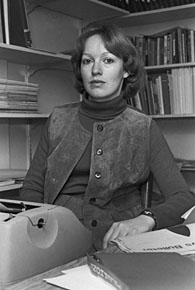Epilogue

By Victoria Lees, PhD'77
Twenty-five years ago, having written exactly three short articles for the McGill News, I was, incredibly, appointed editor. A freshly minted PhD in medieval literature, a field with five hotly contested job openings per century, I had been called in for an interview at which it soon became apparent that I knew nothing about editing a magazine. Nevertheless (I learned years later), one interviewer turned to another and observed, "She has none of the qualifications we need, but let's hire her anyhow." And so my journalistic career began.
The typesetters and printers were as astute as my interviewers -- they spotted my ignorance at once and with enormous grace and humour set about to transform me into an editor. Communication was a problem: I spoke halting high-school French, they impenetrable joual. Undeterred, they gradually passed on the arcane vocabulary of the trade, albeit richly embellished with the religious expletives so favoured in Quebec; it was months before I realized that calice (or chalice, pronounced "caulisse"), was not a machine that constantly broke down: "C't'un calice de problème."
At a certain point in the magazine's production schedule I would head for the industrial outskirts of Montreal to supervise le paste-up. The typesetting establishment smelled of paper and ink and wax and coffee, and the paste-up men stood side by side at a counter that circled the room. They sported big linen aprons because it was dirty work, the ink and wax used in layout adhering to everything. With flashing x-acto blades, they would slice columns of type and paste them down with wax to replicate the rough layouts we had created at Martlet House.
|
|
 Victoria Lees in
her days as editor of McGill News Victoria Lees in
her days as editor of McGill News
|
|
|
|
Inevitably, problems with a photo or a graphic would mean we had to cut or add text. A call for more text was challenging, particularly if I had not written the article. But a paste-up man waiting for 30 lines of type, arms crossed impatiently over his chest, had no sympathy for a sissy affectation like writer's block, and it's amazing how fast words will come. If we had excess copy, I would rewrite "Financial problems are universally acknowledged to be a major challenge" to read "Money is tight," line up in front of le typographe, run back with my three words to le maquettiste and he would x-acto them into the layout after excising the earlier sentence and tossing it to the floor. By day's end, every maquettiste stood knee-deep in mounds of discarded, sticky text.
The paste-up men would clothespin finished pages to a line strung down the length of the room, and scribes like me would walk the line checking for continuity. The News was not the only publication they produced. Interspersed with the chaste prose of our august publication hung lurid pages from the tabloid Allô Police and a porn magazine for men with a penchant for female posteriors, a rag I called Big Bottoms and considered an excellent example of niche marketing. It was my constant fear that one day, through some horrible accident, a paragraph from Big Bottoms would mysteriously appear in the News and I would have to leave town.
One steaming summer Friday afternoon at the typesetters, tired, dirty, sticky with wax and sweat, I was called to the phone and patched through, amazingly enough, to the chancellor of the
University, Conrad Featherstonhaugh Harrington himself. Mr. Harrington believed we were about to attribute to a certain vice-principal comments derogatory to the University. Although I assured him that was not the case, he remained unconvinced, and the discussion went on for some time during which I absently perused lines from Big Bottoms as I pulled them from my hair and peeled them off my shoes.
Finally, voice rising, Mr. Harrington ordered me to stop the presses. I replied that I could not stop the presses without losing our place in the print lineup, delaying publication for weeks and rendering many articles and advertisements out of date.
Mr. Harrington shouted down the line, "I am the Chancellor and I insist that you stop the presses!" As they say in novels, something snapped. Drawing myself up to my full height, I replied haughtily, "You may be the Chancellor of McGill University, but I am the editor of the McGill News and I refuse."
"On your head be it!" he roared, and the line went dead.
Bravado is all very well on Friday before a long weekend, when one is insulated from the campus by the entire length of the island, but Tuesday inevitably arrives. Three days later, I crept nervously into my office to find the Director of Alumni Relations, Tom Thompson, waiting for me.
I looked gloomily at Tom, who, eyes crinkling, said, "I've come to report a late-breaking story. The Chancellor has resigned over an argument he had with the editor of the McGill News."
It wasn't true, of course. Conrad Harrington reigned for years to come, and our paths crossed many times; whenever I glimpsed him across the room at a University function, I became totally absorbed in the hors d'oeuvres. But I never forgot that Tom stood by me when he didn't know my side of the story, and that he never even asked.
Victoria Lees was editor of the News from 1977 to 1979. She went on to a successful and varied career at McGill, and retired in December after seven years as Secretary-General.


